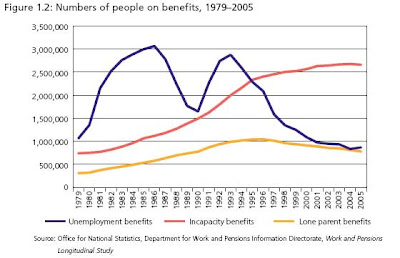On the face of it taxpayers should join the Tories in welcoming the welfare reforms announced yesterday by James Purnell. The headline reforms are:
-
- Incapacity benefit to be scrapped... well, actually, it's not being scrapped, it's just being renamed to the Employment and Support Allowance. But as we've blogged before, recipients will need to have tough new government "fit for work" assessments, with "the expectation" that "all but those with the most severe disabilities" will be required to get back to work
- Jobseekers Allowance - after a year out of work, the able-bodied unemployed will be handed over to private sector contractors, who will have to power to make them work on community or other projects. If still unemployed after two years, they will be put to full-time work on collecting litter etc.
- Migrants - including those from the EU - will not be eligible for incapacity benefit until they've worked here for at least 6 months
- Private sector workfare contractors - as recommended in the Freud Report, commercial and voluntary job brokers will be paid by results to get people back to work.
It all sounds a step in the right direction.
But as others have pointed out, headline announcements are one thing, action is quite another. And reading the Green Paper, we can see that several of the key changes are not even planned to come in for years (and safely past the next election).
Take, for example, those private sector workfare contractors, who right now are everyone's Great Idea. Unfortunately, as we've blogged before, there's an awful lot of devil in their detail (eg see here). For example, how will the contractors be remunerated? How much? How much should fees be back-loaded to incentivise sustained employment? How will the contracts avoid cream skimming (ie the private contractor simply picking the easy cases)? And how on earth will the Simple Shopper manage all that, and still hire competent suppliers (cf the SATs fiasco)?
So what does the Green Paper say?
"The contracts with providers will be underpinned by a new and innovative financing arrangement between the Department for Work and Pensions and HM Treasury, which will allow the Department to directly capture the benefit savings, out of which providers will be paid, but offset by increased obligations." (para 3.27)
New and innovative financing arrangements? From the Shopper? Sounds very scary. No wonder the Green Paper says it will run a handful of pilot projects first, and that the scheme will not be "rolled out" nationally before 2013-14 at the earliest (para 3.28). A small detail that somehow didn't make it into the headlines.
And remember: all the billions that Labour has already spent on workfare - its New Deal programmes - have cost taxpayers more than we've saved in lower benefits payments and higher tax receipts. Yes that's right - they've actually cost us more money than we were spending already (see this blog on the Public Accounts Committee probe).
The redoubtable Frank Field is unimpressed:
"The first part of any serious reform should have been to create a single rate of benefit for all claimants of working age, thus taking away the perverse incentive to join the ranks of the officially long-term sick. Claimants with a disability would still be able to claim the disability living allowance - which all disabled people can receive, regardless of whether they are in work or not."
Spot on: as always, follow the money, especially when it comes to personal incentives. As for those new and supposedly tougher medical tests for getting onto IB, Field says:
"The Government may think that its new test is on a par with the Enigma Codes, but past experience shows that the best schemes that the Department for Work and Pensions can devise are quickly broken by groups of highly talented code-breaking claimants."
So the overall score?
Purnell has certainly moved in the right direction (and has got the headlines to prove it). But the details are still flakey, and what he's not done is to copy the highly successful US innovations in time limiting benefits. Yesterday a BBC reporter opined that was because UK public opinion is softer than US public opinion, and we would never condone such harsh measures.
To which we say, it's never been offered.
PS There's little doubt that our existing benefits system is widely abused. It's even spawned a whole new service industry: just last week we learned of website Benefits and Work which for £95 reportedly gives advice on "how to milk the benefits system. Tips include making sure walking sticks look well used and ensuring people arrive at benefits hearings in a taxi, so it looks like they are too unwell to take the bus". Mind you, the DWP's own Jobcentres do a pretty good job on that score. An acquaintance of your correspondent's unexpectedly found herself back in the job market in her mid-fifties. She naturally went to the local Jobcentre and, while they had absolutely nothing in terms of suitable work, they were able to get her some superb advice on milking the benefits system. She was so shocked at just how much she could get, she marched straight out and found herself a job within a couple of days.
